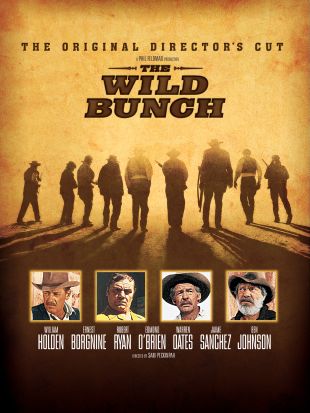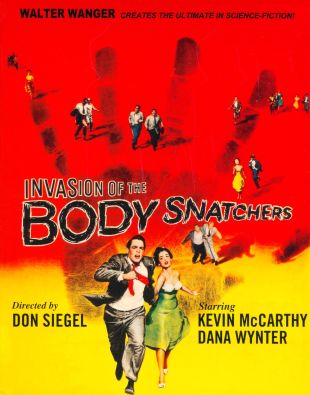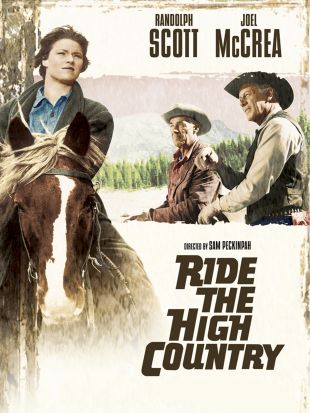Believing real-life turmoil bred peerless creativity, Sam Peckinpah left an indelible mark on post-1960s cinema with a relatively small body of work that was not for the faint of heart, either in the audience or his collaborators. Peckinpah's unruly, incendiary vision turned such films as Ride the High Country (1962), The Wild Bunch (1969), and the non-Western Straw Dogs (1971) into forceful, complex ruminations on violence, morality, and manhood.
Born in Fresno, CA, and raised on a ranch on nearby Peckinpah Mountain by his sober mother and judge father, descendants of pioneer settlers, Peckinpah learned to ride and shoot as a child and idolized his hardy Superior Court jurist grandfather. A boozing, violence-prone troublemaker by his teens, Peckinpah spent his senior year at military school, joining the Marines in 1943 after graduation. Enrolling at Fresno State College in 1947, Peckinpah discovered his calling when his schoolmate and first wife-to-be turned him on to drama. Relocating to Los Angeles to get his master's degree at U.S.C., Peckinpah began directing theater and took a job at KLAC-TV as a stagehand. He was subsequently fired from his menial job on Liberace's TV show for not wearing a suit. Peckinpah's luck changed when he was hired as Don Siegel's assistant at Allied Artists. Well matched in cinematic temperament, Siegel became Peckinpah's mentor as he learned the craft on five Siegel films. Peckinpah also began writing scripts for TV Westerns in 1955, contributing episodes to several shows, including Gunsmoke and Have Gun, Will Travel. Getting a shot at directing with an episode of Broken Arrow in 1958, Peckinpah further honed his skills with episodes of The Rifleman and The Westerner.
Peckinpah got his first feature to direct when The Westerner star Brian Keith suggested him for The Deadly Companions (1961). Though more a vehicle for star Maureen O'Hara than the director, The Deadly Companions nevertheless helped Peckinpah land his second film, Ride the High Country (1962). A spectacular meditation on the passing of the West starring wizened screen cowboys Joel McCrea and Randolph Scott as two gunfighters confronting their mortality, Ride the High Country proved that Peckinpah could already enter his house justified as a filmmaker. The studio thought otherwise, dumping it on its first release; critical accolades and foreign film prizes, however, gave Ride the High Country another shot stateside. With a considerable budget and an unfinished script, Peckinpah embarked on his third Western, Major Dundee (1965), starring Charlton Heston and Richard Harris as two former comrades who clash during an Apache roundup. Shot in Mexico, the production of Major Dundee fell into chaos as Peckinpah fired crew members, fought with producers, and was threatened with grievous bodily harm by a (literally) saber-rattling Heston. When the studio decided to fire Peckinpah, however, Heston gave back his salary to let Peckinpah finish. After Peckinpah's cut came in at over two hours, though, he was ousted and the studio eviscerated the movie, removing scenes that reportedly gave Major Dundee even more thematic heft than Ride the High Country. The resulting mess left critics and audiences cold; Peckinpah's deteriorating reputation (and his obstreperousness) got him fired from The Cincinnati Kid (1965).
Blackballed for several years, Peckinpah survived by writing scripts. By the time he got to direct again in the late '60s, the parameters of movie violence had changed. Reuniting with High Country cinematographer Lucien Ballard, stock company regulars Warren Oates and L.Q. Jones, and adding stars William Holden, Ernest Borgnine, and Robert Ryan to the mix, Peckinpah explosively probed the nature of mythic Western violence and moral relativity in The Wild Bunch (1969). Greeted by reactions ranging from "brilliant" to "sick," The Wild Bunch was only a modest hit, even after Warner Bros. cut ten minutes of exposition, but its impact on Hollywood cinema reverberated for years to come.
Peckinpah followed The Wild Bunch with a distinctly different Western elegy, The Ballad of Cable Hogue (1970). Starring Jason Robards as another Westerner who can't handle the end of the West, Cable Hogue was gentle and funny; its botched release, however, did it no justice. After this respite, Peckinpah returned to plumbing the depths of man's bestiality in his most controversial film, Straw Dogs (1971). Starring Dustin Hoffman as a nerdy American math teacher and Susan George as his wanton British wife, Straw Dogs chillingly surmised that even the most pacifist soul harbors an abyss of lethal, instinctual violence. Provoking heated objections to its rape scene in particular and visceral cruelty and nihilism in general, Straw Dogs nevertheless drew an audience and confirmed the potency of Peckinpah's methods. As if to prove his assertions that he himself abhorred the kind of violence portrayed in Straw Dogs, Peckinpah eschewed guns and bloodletting in his next film, Junior Bonner (1972). Another mild, wistful take on Western masculine values and their modern demise, Junior Bonner starred Steve McQueen as a rodeo rider past his prime who has a comic and sad return to his hometown. Though Junior Bonner was a poorly distributed financial failure, Peckinpah got along well enough with his former Cincinnati Kid star to re-team with McQueen for the more conventional action vehicle The Getaway (1972).
The Getaway's success didn't prevent Peckinpah's next film, and last western, Pat Garrett and Billy the Kid (1973), from turning into, as he put it, his "worst experience since Major Dundee." Locking horns with the studio during the Mexico shoot, the on-set battles escalated until the unit manager's threat during an argument to have Peckinpah killed resulted in a Peckinpah crony hiring local gunmen to off the unit manager. The hit was canceled and the manager exited; Pat Garrett was sloppily recut by the studio, and the incoherent release version failed. After the scenes were restored in 1988, Pat Garrett and Billy the Kid was revealed to be a fitting exit from the genre for Peckinpah. Peckinpah went on to throw himself into Bring Me the Head of Alfredo Garcia (1974). A strange, bloody revenge story starring Warren Oates as a hapless American in Mexico determined to fulfill the title edict his way, Bring Me the Head of Alfredo Garcia was dumped in the U.S. and lavishly praised abroad.
Always a hardcore alcoholic, Peckinpah discovered cocaine while shooting his next film, espionage actioner The Killer Elite (1975). Though The Killer Elite was a reasonably successful endeavor, one Peckinpah biographer later surmised that the cocaine addiction crippled Peckinpah's creative powers. Still, Peckinpah's sole war movie, Cross of Iron (1977), delivered a powerful antiwar message in depicting two philosophically opposed German officers on the Russian front in World War II. His final two films, comic trucker adventure Convoy (1978) and Robert Ludlum adaptation The Osterman Weekend (1983), however, were strictly mediocre. Though Peckinpah suffered a heart attack in 1979, he never retired. Along with branching out into music video with two clips for Julian Lennon, Peckinpah was preparing a Stephen King adaptation when he suffered a fatal heart attack in 1984. Peckinpah's five marriages (three to the same woman) all ended in divorce.


